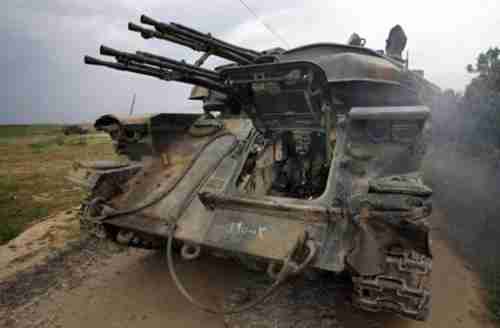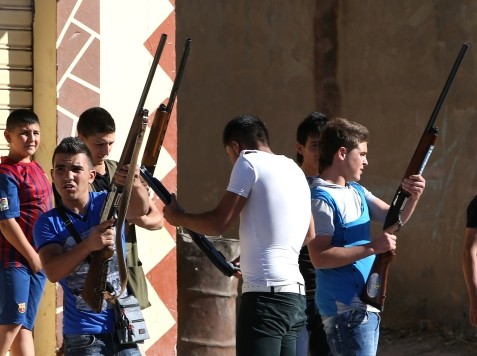
This morning’s key headlines from GenerationalDynamics.com
- Syria and Hezbollah gloat over victory in town of Qusair
- Assad’s Qusair victory renews debate about military intervention
- Thousands of American troops to Jordan for ‘Eager Lion’
Syria and Hezbollah gloat over victory in town of Qusair

A Syrian army soldier sits inside a tank (AFP)
Syria’s army scored a decisive victory on Wednesday inthe strategic town of Qusair which controls major transportationroutes in southwest Syria. According to the Syrian army:
“We will not hesitate to crush with an iron fist thosewho attack us. … Their fate is surrender or death. We willcontinue our string of victories until we regain every inch ofSyrian land. [The capture was] a clear message to all thoseparticipating in the aggression against Syria.”
Analysts are saying that the capture of Qusair gives a tremendousboost to Hezbollah, which will now be empowered to continue openlyfighting along side the Syrian regime’s army. According to Lebaneseretired general Hisham Jaber:
“Hezbollah will fight anywhere in Syria that requiresguerrilla warfare tactics. It fought in Qusair because streetbattles were required there, and I do not rule out the possibilitythat it will join more street battles in Aleppo as well. TheSyrian army is incapable of fighting street battles.”
A Hezbollah supporter, Lebanese retired Gen. Amin Hoteit, agreed:
“The equation is clear, Syria is being subjected toWestern aggression spearheaded by Israel. This means thatHezbollah is actually fighting Israel and it is ready to do thisanywhere in Syria.
By joining the war, Hezbollah and Syria are affirming the strategyof the resistance axis, which is … together we confront the samedanger.”
The Qusair represents a major victory for Syria’s president Basharal-Assad, for Hizbollah’s leader Sayyed Hassan Nasrallah, and forRussia’s president Vladimir Putin. Daily Star (Beirut) and Daily Star (Beirut)
Assad’s Qusair victory renews debate about military intervention
The gloating by Syria’s president Bashar al-Assad and Lebanon’sterrorist group Hezbollah is raising nationalist fervor outsideof Syria, and is renewing the debate whether the West shouldintervene military.
Both Susan Rice and Samantha Power, both of whom were given nationalsecurity promotions on Wednesday by the Obama Administration, havebeen advocates in the past of military intervention in the Darfurcrisis civil war. As I’ve written in the past, military interventionin Darfur would have been a disastrous error. (See “Senator Joe Biden wants to move troops from Iraq to Darfur civil war” from 2007.)
So at the very least, these two women’s appointments can be expectedto heat up the debate whether America should intervene militarily,especially after the humiliation of seeing Russia’s clients score ancritical victory against America’s clients.
There is already a bitter division in the cabinet of Britain’s primeminister David Cameron. Cameron himself favors military intervention,but at least five members of his capability oppose intervention, arguethat supplying weapons to the Free Syrian Army might only escalate theconflict, killing many more people, without any realistic prospect ofproviding a decisive victory for the rebels.
Analysts that I heard on Wednesday are split on the significanceof the regime’s Qusair victory, with some downplaying thesignificance of Qusair, and others saying that it’s important,but its loss is part of the “ebb and flow” of the war.
From the point of view of Generational Dynamics, one mustrecognize the possibility that al-Assad’s Qusair victorymay lead to the complete collapse of the rebel side.As I’ve written many, many times, Syria is in a generationalAwakening era, like America in the 1960s, with little desireamong the Syrian people for a war. The war has been propelledentirely by the psychopathic president Bashar al-Assad, withheavy weapons supplied by Russia and Iran, and guerilla fighterssupplied by Hezbollah. Without that outside support, al-Assad’sarmy would have collapsed long ago. But with that support,it’s the rebel side that vulnerable to collapse, and thatcollapse may be close.
In that event, there are almost certainly going to be bitterrecriminations in the West, as this will be the third such loss thatmight be blamed on the Obama administration:
- Sectarian violence has been growing steadily in Iraq since December, 2011, when the American forces pulled out.
- Afghanistan’s government is very unlikely to survive the pullout of American forces.
- And now a possible victory by al-Assad in Syria.
The politics of this situation cannot easily be predicted, butAmericans do not like to lose wars, or even appear to have lost wars,especially to dictators and terrorists. It’s possible that the lossof Syria will trigger a nationalistic backlash in America, and arenewal of hostilities between Hezbollah and Israel. Bloomberg and Independent (London)
Thousands of American troops to Jordan for ‘Eager Lion’
There are various reports about thousands of American soldiers, aswell as F-16 warplanes, Patriot missile systems, being deployed toJordan this week. These deployments are being ignored by themainstream media, but they’re not secret either, as they’re part of along-scheduled military exercise called “Eager Lion 2013,” scheduledfor later this month. The exercise will involve about 8,000personnel. About 5,000 of those will be U.S., and about 3,000 will beJordanian. Other participating countries include Britain, Bahrain,Canada, the Czech Republic, Egypt, France, Iraq, Italy, Lebanon,Pakistan, Poland, Qatar, Turkey, the United Arab Emirates, SaudiArabia and Yemen.
The heavy involvement of American forces and equipment is raisingquestions about whether something further is planned besides themilitary exercises. Possibilities include: military intervention inSyria, providing heavy weapons to the Syrian rebels, simply sending amessage to Russia, Iran and al-Assad, or providing military supportfor Jordan, an American ally. Debka and UPI and Army.mil
Permanent web link to this article
Receive daily World View columns by e-mail

COMMENTS
Please let us know if you're having issues with commenting.